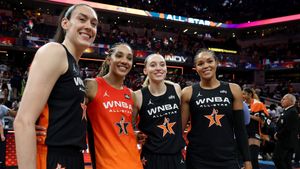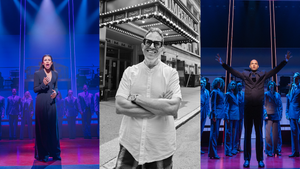There has been much speculation and discussion during the past few weeks about the November elections and their impact on the future strategies of the GLBT movement. Some people--in the news media and elsewhere--have erroneously suggested that the issue of equal marriage rights for same-sex couples was a deciding factor.But one of the most important and underreported numbers to emerge from the November 2 exit polls is that 62% of voters said they support legal recognition for same-sex couples. This represents a remarkable transformation in public opinion in just a few short years (and, incidentally, one that contrasts sharply with the gratuitous hand-wringing that ensued after 22% of voters identified "moral values" as their top voting issue). The exit poll demonstrates the importance of the work our community has done and the significant progress we've made in changing hearts and minds around the issue of marriage.The New York Times reported on December 9 that there is a debate within the GLBT community about whether we should pull back on our pursuit of equality. The article focused on the strategies of the Human Rights Campaign in this post-election environment following the recent departure of its executive director. The Times also ran a follow-up article on December 11 that added little if any clarity to the original.One key issue raised in both articles was Social Security. I do believe that there is a real opportunity for our civil rights movement to use the public conversation about Social Security to spotlight the fact that same-sex couples are unfairly barred from the full protections Social Security provides. It's something that a lot of Americans do not know, and if we can make that inequity part of this discussion, they will see this situation for what it is: unfair, discriminatory, and hurtful. It's exactly the kind of effective use of our stories that is at the heart of GLAAD's mission and work.However, this potential opportunity was eclipsed by a notion, advanced in the Times article, that some in our community might contemplate a policy position on Social Security that many believe would harm seniors. And the public concerns voiced by our community in the past few days have made one thing abundantly clear: We should never work--or be perceived to be working--to secure our equality at the expense of others.HRC released a statement challenging both the accuracy and the tone of the Times article and is asking for a correction and/or an opportunity to respond. But the truth is that many, many more folks see the front-page stories of The New York Times than see a correction or a letter to the editor. For many of the paper's readers, the perception of that headline "Groups Debate Slower Strategy on Gay Rights" has become the reality.As it relates to the headline and lead sentences of this story, let me make a few observations. First, they are not true. I know that I personally am not engaged in any discussions about slowing our organizations' or our movement's strategy.Second, it's not what I believe should be happening. Our visibility is our power right now, and it must not slow. The public nature of this debate is one of the most important victories we have achieved. We must keep it alive. It may feel hard at times, but this public argument will continue to benefit us in the long term.Third, it's not what I am seeing or hearing. As I travel around the country, I see people in our community who are engaged, angry, and determined. They are clear in their understanding that being vocal and visible is essential to our progress. I believe that the past 18 months--which has seen extraordinary victories and painful setbacks--have galvanized our community like never before, and the response to the Times article has shown that any notion of retreat will be met with strong opposition and a renewed commitment to moving forward.And last but not least, it is certainly not true for us at GLAAD. Short-term progress may indeed slow on the political and legislative front. But we know that most politicians don't lead; they follow. They follow public opinion. And GLAAD's work to ensure that we are visible, that the media connect more Americans to our stories and our lives, and that we cultivate smart, articulate voices to share those stories is key to shaping and transforming that opinion.The debate over marriage is a crucial vehicle for sharing our humanity and our families with the world. The anti-gay industry wins when it makes us abstract. We win when we are human. There is nothing more fundamentally human than our ability to love. And the leverage we gain from our legal and cultural progress in this area cannot and should not be sacrificed for an ephemeral sense of security in a moment of fear.Slow down? Should we tell my friends Tanya and Amy that they shouldn't have gone to Massachusetts to get married? Or that they should not stand as plaintiffs in a challenge that state's law barring out-of-state couples from marrying there? Should we tell Julie and Hillary Goodridge's kids that their moms should not have fought to make sure that they have the kinds of strong legal ties to their family that come with a Massachusetts marriage license?Slow down? I don't think so.A decade from now we will look back at this year as a time when our rights to fairness and equality were debated across the globe: in Canada, Spain, Israel, South Africa, the United Kingdom., Ireland, Australia, New Zealand and elsewhere. Not to mention right here at home: at the kitchen table, around the water cooler, in houses of worship, in the media, before the courts, and yes, at the ballot box. Without this vital dialogue, public understanding of our lives and our relationships cannot and will not grow.I believe today's focus on movement strategy, though challenging, has a silver lining. There is growing recognition within our community that public policy debates (including those that do not center on marriage) provide important opportunities for sharing our stories--for personalizing and advancing the discussion about our right to equality. Social Security is but one example. So, among others, are immigration, employment opportunity, health care, family and medical leave, education, taxation, and military service.Let's take a closer look at that last one. A decade ago our community experienced a "defeat" due to the military's exclusion of gay and lesbian service members. We were sure we'd win. We lost. But fast-forward and look at public opinion today. According to a Gallup Poll taken less than a year ago, 79% of Americans think the ban on gay and lesbians serving in the military should be overturned. It was that argument, that public debate a decade ago, that educated people, opened their eyes, and ultimately changed their minds. Those who oppose our ability to serve openly are now on the wrong side of public opinion--and time will prove them to be on the wrong side of history as well.We are on a similar path today. Time is on our side. This national debate about LGBT people and families--our right to exist, our right to be protected, and our right to fair and equal treatment under the law--is not going to end anytime soon. History has shown that our progress along this road will slow--and accelerate--unexpectedly, just as it has for others fighting to secure equal civil rights. But we cannot allow temporary obstacles, daunting though they may seem in the moments when we experience them, to dilute or diminish our resolve to propel this movement forward.




































































Charlie Kirk DID say stoning gay people was the 'perfect law' — and these other heinous quotes